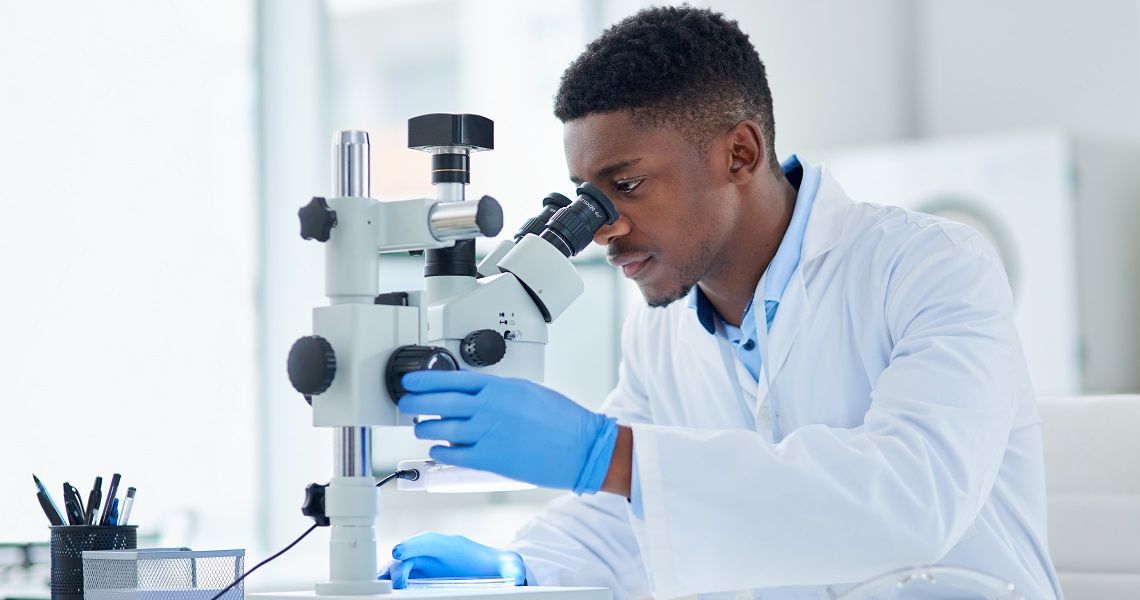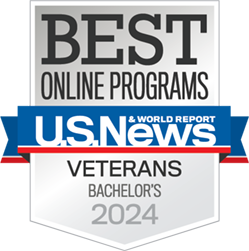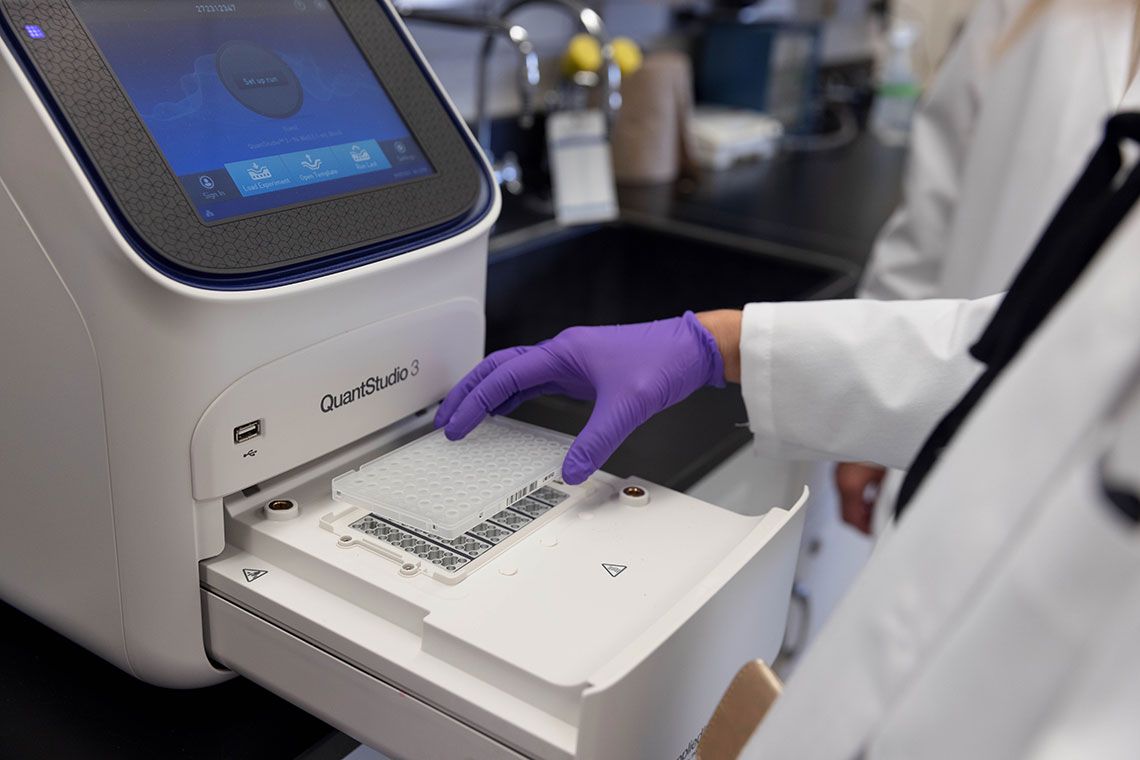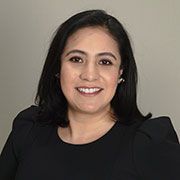
Qualify to Sit for the ASCP MB Exam in 24 Months
Online Coursework
24 Months*
The George Washington University's (GW) online Master of Science in Health Sciences (MSHS) in Molecular Diagnostic Science degree examines the latest nucleic acid-based technologies to provide you with the skills and practical experience to solve complex issues in molecular diagnostics and clinical pathology. Our comprehensive online molecular diagnostics program is one of few that combines advanced molecular testing, biotechnology in diagnostics and biotechnology coursework with an in-person clinical laboratory rotation experience.
To learn more about our MSHS in Molecular Diagnostic Science program, you can register for our upcoming events.
*The total number of credits and duration of the MSHS in Molecular Diagnostic Science program depend on the number of transferred credits.
Program Highlights
- 100% online coursework, no visits to campus required
- Complete your MSHS in Molecular Diagnostic Science degree in 24 months
- Qualify for the ASCP Molecular Biology (MB) exam
- Qualify to sit for the ASCP Technologist in Molecular Biology (MB) exam**
- Applicants with clinical laboratory experience may be eligible to waive individual clinical practicum requirements
Request Information
* Indicates required field
- Read: Privacy Disclaimer Acknowledgment
-
By submitting your contact information, you are providing your express consent authorizing GW and GW's representatives to contact you by email, phone, or text (including the use of an automatic dialing system). Standard text messaging and/or data rates may apply.
If you do not provide your contact information (phone and email), we may not be able to provide you with the information you requested.
If you provided your contact information but no longer wish to receive phone calls, emails, or text (SMS) messages from GW, you will have the option to opt-out. Emails and Text messages will include details for unsubscribing/opting out. To opt out of receiving phone calls from GW, contact us via email at info [at] hsprograms [dot] gwu [dot] edu (info[at]hsprograms[dot]gwu[dot]edu) or text/ call: 202-792-2819.
By submitting your information via this form, you also confirm that you have read and understood the GW Statement of Privacy Practices.
Note that the consent requested above is not required for enrollment in GW's programs. If you do not consent to providing the information requested on this form, you may contact us via email at info [at] hsprograms [dot] gwu [dot] edu (info[at]hsprograms[dot]gwu[dot]edu) or text/ call: 202-792-2819.
Accreditation and Rankings
- GW is accredited by the Middle States Commission on Higher Education
- #62 Best National University*
- #13 Best Online Bachelor's Programs*
- #7 Best Online Programs for Veterans*
* The U.S. News & World Report – 2024 Rankings



Program Outcomes
When you complete the online MSHS in Molecular Diagnostic Science program, you will be able to:
- Apply molecular and genetic theory and principles as they relate to human disease in order to facilitate an appropriate diagnosis and/or prognosis
- Interpret molecular diagnostics test results to determine a probable disease mechanism
- Design a research project that utilizes diagnostic genetics technology to diagnose disease or improve clinical outcomes
- Demonstrate the application of molecular biology in real life
- Communicate, both orally and in writing, in an effective and scholarly manner
- Adhere to all local, state, and federal laboratory regulations to maintain a safe and ethical work environment
Curriculum
In GW’s online MSHS in Molecular Diagnostic Science program, you'll explore diagnostic genetic sciences and learn how to excel in molecular diagnostics, preparing you for clinical laboratory leadership roles in health care organizations, including clinical pathology and molecular laboratories, public health laboratories and biotechnology companies.
Through 12 courses and a total of 35 credit hours, this online MSHS in Molecular Diagnostic Science program explores diagnostic genetics while leveraging distinguished faculty, real-world experience and an innovative curriculum. In two years, you'll gain the comprehensive skills you need to succeed in diagnostic genetics, clinical pathology research and laboratory science management. Applicants with clinical laboratory experience may be eligible to waive individual clinical practicum requirements.
Who Is the Ideal Student for This Program?
The online MSHS in Molecular Diagnostic Science program is designed for individuals who hold national certification or wish to become certified in Molecular Biology and aspire to pursue clinical laboratory leadership positions in healthcare.
Career Outlook
GW's online MSHS in Molecular Diagnostic Science program is one of the few programs that provide students with both traditional coursework in molecular biology, diagnostic genetic sciences, and biotechnology, as well as the hands-on clinical rotation experience required to prepare for ASCP Board Certification in Molecular Biology. This molecular diagnostics program prepares you for a variety of roles, including clinical laboratory leadership, making you highly competitive in the field. Applicants with clinical laboratory experience may be eligible to waive individual clinical practicum requirements.
Upon completion, graduates will be ready to pursue board certification in Molecular Biology and begin an exciting career in a molecular diagnostics laboratory, research institution, public health laboratory, biotechnology firm, a pharmaceutical company, or government agency with titles such as:
- Biotechnology or Government Research Associate
- Molecular Laboratory Scientist
- MLT/MLS Teaching positions
- Public Health Laboratory Scientist
Admission Requirements
To be accepted to the online MSHS in Molecular Diagnostic Science program, you must have:
| Completed application |
| Bachelor’s degree in a basic or medical science (e.g., Biology, Chemistry, Microbiology) from a regionally accredited institution |
| 3.0 GPA or above on a 4.0 scale |
| Resume/CV |
| A written personal statement |
| Two letters of recommendation |
Tuition Details
The MSHS in Molecular Diagnostic Science program at GW consists of 35 credit hours. Explore the cost per credit hour and total estimated program costs.
Note: Tuition rates are subject to change and additional fees may vary by program.
Meet the Program Director

GW's experienced faculty provide you with the rich, practical knowledge and support needed for you to succeed in the MSHS in Molecular Diagnostic Science program and in your career.
Graciela Lopez Gamboa, MD, MSHS
- Read Full Bio
-
Dr. Graciela Lopez is the current program director for the Molecular Diagnostic Sciences and Molecular Diagnostic Science programs. She started her career in 2006 as a physician in Bolivia, later moving to the US where she continued to work in the medical clinical setting for over 10 years. During this time she became interested both in clinical laboratory sciences as well as being part of academics, and in 2018 she graduated from the MSHS in Molecular Diagnostic Sciences program form George Washington University. The following year she began working with the Biomedical Laboratory Department (BLS) as adjunct faculty and since 2022 she has been in a fulltime faculty member. Nowadays, aside from her program director responsibilities she teaches online courses in the different programs available through our department plus she also teaches the in-person Molecular Diagnostics lab for our hybrid students.
Dr. Lopez is passionate about healthcare education and bringing awareness to healthcare careers, especially those within the clinical laboratory setting. She has been involved in developing the Medical Laboratory Technician/Phlebotomy Assistant pathway for the Health Science Academy at Alexandria City Highschool and was the first instructor for that program. She also participated as a mentor for HOSA- Future Health Professionals.
She is currently working on completing the Master Teacher Leadership program through GW University with the goal to continue to improve the courses and programs she is involved with.
She looks forward to working on academic and lab-based research alongside her BLS colleagues, as well as with the students that come through our programs.
Disclaimers:
**While the completion of this MSHS in Molecular Diagnostic Science program will make graduates eligible to register for an ASCP Board of Certification Exam, this does not automatically guarantee a graduate will also meet their states requirements for state licensure (if applicable). Since each state may have different requirements for licensure, each student is encouraged to contact their states regulating agency and review these requirements prior to beginning any degree program.
Best Health Care Support Jobs. USNews.Com
National Accrediting Agency for Clinical Laboratory Sciences (NAACLS)
5600 N River Road, Suite 720
Rosemont, IL 60018-5119
Curriculum Details
36 TOTAL CREDITS REQUIRED
The MSHS in Molecular Diagnostic Science program consists of 30 credits in required (online) coursework, a 3-credit elective course and a 3-credit (laboratory based) practicum to develop a well-rounded and thorough understanding of molecular biology and biotechnology.
Core
- HSCI 6263 Biostatistics for Clinical and Translational Research (3)
-
Basic concepts and methods of biostatistics applied to translational research. Topics include distributions, populations and sample selection, variables, interaction and confounding, hypothesis formulation, correlation, t-tests, ANOVA, regression, and chi.
- MLS 6216 Microbial Pathogenesis (3)
-
A comprehensive overview of the molecular basis of diseases caused by microbial pathogens with a focus on model microbial systems to illustrate mechanisms of the human infectious disease process.
- MLS 6217 Medical Biotechnology (3)
-
A comprehensive overview of current molecular technologies and how they are used in modern medicine.
- MLS 6218 Genetics (3)
-
This course will cover hereditary and molecular genetics, with an emphasis on genomics and human diseases.
- MLS 6219 Molecular Biology (3)
-
This course will emphasize the molecular mechanisms of DNA replication, repair, transcription, translation and gene regulation in prokaryotic and eukaryotic cells.
- MLS 6158 Advanced Laboratory Management and Operations (3)
-
An introduction to critical concepts of lab management, including leadership theory, management principles, human resource management, financial management, quality management, and laboratory operations.
- MLS 6166 Molecular Diagnostics Practicum (3)
-
During this practicum course, the student will actively engage in applying molecular techniques to diagnose various human diseases.* May be substituted with an elective for students with current clinical molecular laboratory experience.
- MLS 6242 Molecular Pathology (3)
-
Investigation of human disease processes with an emphasis on the molecular and genetic mechanisms of disease. The goal of this class is to advance students’ understanding of how molecular, cellular and genetic approaches are used to investigate human diseases.
- MLS 6244 Research Ethics and Integrity (3)
-
Traditional and modern topics in research ethics and scientific integrity Students will learn to conduct unbiased peer-review, conduct research, and report on an independent case examinations, research misconduct or other ethical issues, and participate in oral scientific and ethical discussions.
- MLS 6245 Current Topics in MLS (3)
-
Exploration of findings within the medical laboratory science field. Current topics will be integrated into the development of a required project proposal for the capstone research project that the student will complete in the following semester.
- MLS 6246 Capstone Project (3)
-
Students apply the knowledge gained throughout the program to complete an independent, mentored project. A proposal for the capstone project will have been developed by the student as a component of the Current Topics in MLS course (MLS 6245) during the previous semester.
Elective
- MLS or HSCI Elective (3)
-
Three credits in elective MLS or HSCI courses approved by the program director.
Key Dates
|
Summer 2025 |
Fall 2025 |
Spring 2026 |
|
| Application Deadline |
March 20, 2025 (Closed) |
July 20, 2025 (Open) |
November 19, 2025 (Open) |
Admissions Requirements
To be accepted to the MSHS in Molecular Diagnostic Science program (online coursework), you must have:
| Completed application |
| 3.0 GPA or above on a 4.0 scale |
| Bachelor’s degree in a basic or medical science (e.g., Biology, Chemistry, Microbiology) from a regionally accredited institution. |
| Resume/CV |
| Completed courses should include: 3 credits English; 3 credits of college math (algebra, statistics, or higher). Additionally, students must have completed a combination of 30 semester hours or 45 quarter hours of biological, chemical and/or medical science courses with a grade of C or higher that includes the following courses: general biology I and II with hands-on lab; general or inorganic chemistry with hands-on lab. Please be prepared to provide unofficial transcripts to determine program admissibility. |
| A written personal statement: Applicants must include a 250–500 word essay describing your reasons for undertaking study at GW, your academic objectives, career goals and related qualifications, including collegiate, professional, and community activities, relevant to your program of interest. Include any substantial accomplishments not already mentioned on the application form. |
| Official transcripts from every college and university attended. All non-U.S. transcripts (including those in English) must be evaluated by an accredited foreign credential agency. Please find the list of member organizations here: https://www.naces.org/members. |
| Application fee: A non-refundable application fee of $80 is required. The application fee is waived for active-duty U.S. military, current GW students, degree-holding GW alumni, current McNair Program Scholars, and graduates of minority-serving institutions (MSI). |
|
Two letters of recommendation Letters of recommendation should be from:
Recommender will submit a letter on letterhead with a signature and credentials/contact information via the application portal. |
| Students who live outside of the Washington, D.C., metro area are required to secure a clinical site at the time of admission, the site needs to satisfactorily meet the requirements for clinical rotation in molecular diagnostics. |
| Review the Criminal Background Check and Drug Screening Policies in the Health Sciences Programs Bulletin |
| Since each state may have different requirements for licensure, each student is encouraged to contact their state’s regulating agency and review these requirements prior to beginning any degree program. State’s requiring licensure may require extended duration of practicum experiences. Also, some states, such as New York, do not provide licensure for categorical certification (e.g., Technologist in Microbiology). |
NOTE: This program is authorized, exempt, or not subject to state regulatory compliance and may enroll students from all 50 states, U.S. territories and the District of Columbia.
International Students
Effective Fall 2025
International students should check with individual programs regarding eligibility for visa sponsorship. Generally, online and hybrid programs are not eligible for student visa sponsorship from GW. This would include transfer students from any other institution with an existing visa. To be considered for admission, there are required scores that you will need to meet. Score requirements may differ by school and program so check the admissions requirements for your program.
Applicants who have not completed a post-secondary degree from an institution where English is the sole language of instruction are required to submit TOEFL, IELTS, PTE Academic, or the Duolingo English Test scores to be considered for admission. The following are the minimum scores for admission consideration:
- TOEFL: 600 on paper based, 250 on computer-based, or 100 Internet-based,
- PTE: overall score of 68,
- IELTS: an overall band score of 7.0, with no individual band score below 6.0
- DET overall score of 120.
Undergraduate applicants who meet one of the following conditions may be considered for admission without submitting TOEFL, PTE or IELTS or DET scores:
- You have earned an associate’s degree or higher from an institution where English is the sole language of instruction
- You are a citizen of an English-speaking country
Scores may not be more than two years old. To ensure TOEFL scores are sent to GW, use institutional code 5246. An institutional code is not required to send IELTS or PTE scores to GW. DET scores must be submitted via the Duolingo English Test system directly to GW.
Based on the results of your English Proficiency exam results and your application, you may be required to take English for Academic Purposes (EAP) during your first year of study at GW. Please note that GW evaluates each application holistically so applicants may still be recommended for EAP even if they meet the requirements for exemption. Students placed in EAP courses should anticipate additional tuition expenses as well as possible extension of time needed to complete their degree programs.
Official transcripts from institutions outside the U.S. must be accompanied by an official transcript evaluation from an accredited independent evaluating agency. Please be sure you request a detailed evaluation that includes all course titles, credit hours, grades, U.S. degree equivalency, grade-point averages (GPA), and date of degree conferral (course by course evaluation). For a list of acceptable foreign credential evaluation services, please visit NACES.
Supporting documents not submitted online should be mailed to:
Mail: George Washington University
ATTN: Transcript Processing Center
1415 W 22nd St.
Suite 220
Oak Brook, IL 60523
Alternatively, official electronic transcripts can be sent to: transcripts [at] hsprograms [dot] gwu [dot] edu (transcripts[at]hsprograms[dot]gwu[dot]edu)